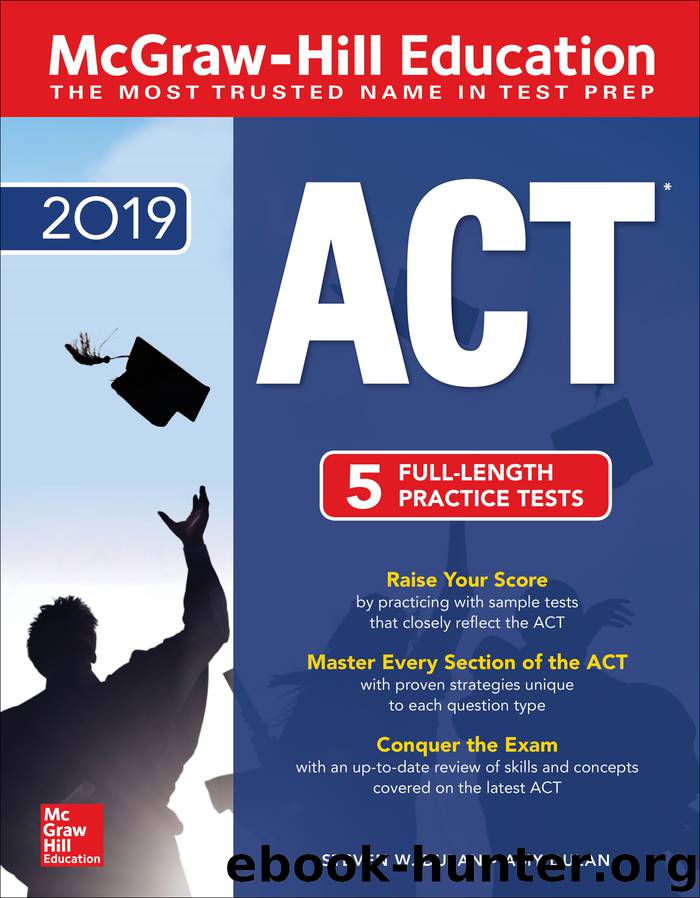McGraw-Hill ACT 2019 edition by Steven W. Dulan

Author:Steven W. Dulan
Language: eng
Format: epub
Publisher: McGraw-Hill Education
Published: 2018-08-12T16:00:00+00:00
PASSAGE II
16. The best answer is H. The second sentence contains a contrast to what comes before. That is, the first sentence says Vikings were crude; the second appears to contradict that by saying they were advanced. The word however is the only choice to signal this contrast.
17. The best answer is D. Because the new sentence would follow an assertion that the Vikings were advanced, the logical choice would contain an example of some sort of accomplishment. Answer choice D is one such accomplishment, and it mirrors the next sentence, which elaborates on the Vikings’ oceangoing superiority compared to other European cultures even centuries later, of which Christopher Columbus was a part.
18. The best answer is J. The adjective seafaring modifies the noun traders, so no comma must come between the two words. Eliminate answer choice F. The colon has very specific usages, and cannot be used in this position between a noun (traders) and a prepositional phrase (with … ships) that modifies it. Eliminate answer choice G. Answer choice H can be eliminated because no comma should separate a preposition (with) from its object (purpose-built, wooden trading ships).
19. The best answer is A. The sentence as it is written is the most concise statement of the information. Therefore, no change is necessary.
20. The best answer is G. Use the adjective “much” to modify the noun phrase “shorter distance.”
21. The best answer is B. The first step in answering this question is to recognize that you must use the possessive determiner their, not the contraction of they are. Eliminate answer choice D. The phrase “Regardless of whether Vikings arrived first” is not an independent clause. Therefore, it cannot be separated from the rest of the sentence by a semicolon. A colon would be used if what followed were an example or a list. Since it’s not, a comma is the only punctuation necessary.
22. The best answer is H. It is idiomatic to say sailed around, sailed over, sailed across, and sailed on the sea in this context. It is not appropriate to say the Vikings sailed into the sea to obtain goods.
23. The best answer is B. In order to maintain parallel structure, the tense of meet has to match the tense of its paired verb, trade. Here, the author tells you that, in the past, Vikings traded often with Arabs. Since met is the past tense of meet, answer choice B is correct.
24. The best answer is H. Although all the answer choices have at least some merit, only answer choice H suits the rest of the paragraph. Moreover, the next sentence begins: Similar craftsmanship …. Therefore, the underlined portion should speak to the craftsmanship exhibited in Viking sword and ax blades. Answer choice H contains the most specific details about the fineness of the blades.
25. The best answer is D. The phrase beginning Making butter … is not a complete sentence; it lacks a verb with tense. Therefore, you should not use any form of end punctuation before that phrase.
Download
This site does not store any files on its server. We only index and link to content provided by other sites. Please contact the content providers to delete copyright contents if any and email us, we'll remove relevant links or contents immediately.
| Administration | Assessment |
| Educational Psychology | Experimental Methods |
| History | Language Experience Approach |
| Philosophy & Social Aspects | Reform & Policy |
| Research |
The Art of Coaching Workbook by Elena Aguilar(51203)
Trainspotting by Irvine Welsh(21678)
Twilight of the Idols With the Antichrist and Ecce Homo by Friedrich Nietzsche(18638)
Fangirl by Rainbow Rowell(9256)
Periodization Training for Sports by Tudor Bompa(8275)
Change Your Questions, Change Your Life by Marilee Adams(7786)
This Is How You Lose Her by Junot Diaz(6890)
Asking the Right Questions: A Guide to Critical Thinking by M. Neil Browne & Stuart M. Keeley(5778)
Grit by Angela Duckworth(5616)
Red Sparrow by Jason Matthews(5477)
Paper Towns by Green John(5193)
Room 212 by Kate Stewart(5127)
Ken Follett - World without end by Ken Follett(4737)
Housekeeping by Marilynne Robinson(4452)
The Sports Rules Book by Human Kinetics(4391)
Papillon (English) by Henri Charrière(4276)
Double Down (Diary of a Wimpy Kid Book 11) by Jeff Kinney(4275)
The Motorcycle Diaries by Ernesto Che Guevara(4105)
Exercise Technique Manual for Resistance Training by National Strength & Conditioning Association(4075)
